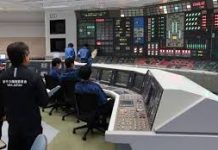UNITED NATIONS, Oct 30 Pakistan has called for equitable and non-discriminatory access to civil nuclear cooperation to meet the country’s energy needs, while reaffirming its commitment to nuclear security.
“We underscore that removal of barriers for gaining equitable and non- discriminatory access to civil nuclear cooperation is of fundamental importance,”
Pakistani delegate Syed Atif Raza told the United Nations General Assembly on Wednesday during a debate on the annual report of the International Atomic Energy Agency (IAEA), the Vienna-based UN agency.
“There is a need to eliminate discrimination inherent in existing non-proliferation arrangements and establish a framework for promoting peaceful nuclear energy under appropriate international safeguards,” said Raza, a counsellor at the Pakistan Mission to the UN.
At the outset, IAEA Director General Rafael Mariano Grossi presented his report on its work, including in Ukraine, Iran and Syria, as well as an overview of the development and transfer of nuclear technologies for peaceful applications, the enhancement of nuclear safety and security, and the strengthening of nuclear verification and non-proliferation efforts on a global scale.
The Agency’s initiatives include training women workers in the nuclear industry through the Marie Curie and Lise Meitner fellowships and deploying nuclear technology for health, food security, and environmental protection.
In his remarks, Raza, the Pakistani delegate, said Pakistan upholds the highest standards of nuclear safety and security which are in line with the IAEA standards.
Underscoring that all States fully comply with their respective safeguards obligations, he said that those commitments should not be used to serve partisan political objectives. “Its verification regime will remain credible only if it is applied on a non-discriminatory basis as stipulated in the Agency’s Statute.”
Pakistan, he said, believes that attacks on safeguarded nuclear facilities undermine the IAEA’s safeguards mechanism, contravene international law, the charter of the UN, Statute of the IAEA and relevant General Conference resolutions.
Raza highlighted Pakistan’s extensive experience in operating a secure and fully safeguarded nuclear power programme, pointing to six nuclear power plants with a combined capacity of 3,530 megawatts. During last year, he added, the total nuclear energy generation contributed to 18% of the overall energy mix, which translates to 34% of our low-carbon energy production preventing approximately 15 million tonnes of CO2 emissions every year.
“Pakistan stands ready to further strengthen partnership with the IAEA and other Member States in promoting peaceful uses of nuclear energy to realize our collective objectives and sustainable development goals,” the Pakistani delegate said.

















